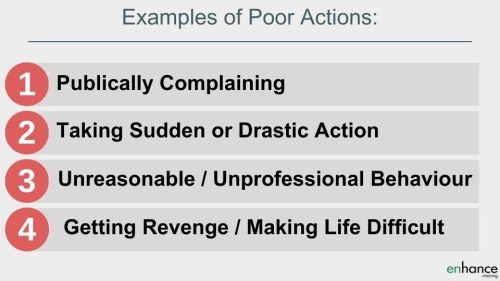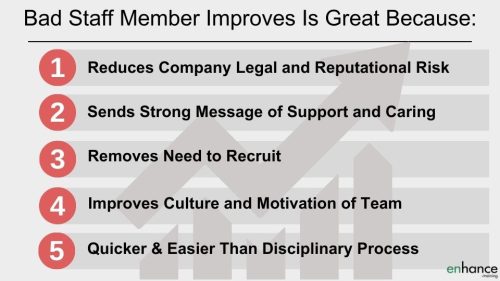5 Actions for Bad Staff Members at Work to Build Trust, Not Fear

Every manager hates having bad staff members in their team. You have the double whammy of the extra stress and pressure plus underperforming employees or disruptive staff reducing team performance.
Taking any action is difficult enough – no-one likes all those difficult conversations with the boss, HR and the bad staff member. Even worse is that the action you take is going to impact your teams trust, motivation, and performance. We all want that impact to be positive, yet so often action taken by managers impacts the team negatively, which leads to loss of trust, motivation, and performance.
I am sharing 5 actions for bad staff members at work to build trust, not fear. For each action, I am explaining why taking fair and effective action is so important and giving your practical tips for how to take action that builds trust in you with all the team members and colleagues watching what happens.
5 Actions for Bad Staff Members at Work to Build Trust
- Action is a must – be fair and escalate in steps
- Be Clear why you are taking action
- Make it easy for the bad staff member to improve
- Fairness builds support
- Make Sure the team wins
Watch on YouTube
Listen on Podcast
Action is a must for bad team members at work
… assuming of course that you want to do well and have your team do well too. It is in everyone’s best interest that you take action, including more often than not the bad staff member.
If the bad team member is negatively impacting the team or other team members, then they will be expecting you to do something to help them. When you don’t take action, you lose some of their trust and respect at best, through to outright anger at you and staff members leaving the team.
If you don’t take action, you will be left with the weaker team members, a team others don’t want to join and little chance of promotion at this company. Very few managers find this appealing.
You must take action.
There many negative actions you need to avoid taking to maintain or improve the trust the team have in you.
Some examples
of poor actions include:
- Publicly complaining about the bad staff member
- Taking sudden or drastic action such as firing them on the spot
- Engaging in unreasonable or unprofessional behaviour towards the problem employee
- Getting revenge by giving them all the boring tasks or trying to make their life difficult in the hope they will leave
I have seen managers afraid to have the difficult conversations and be honest with problem team member. Frustration, anger, and resentment build until they suddenly take drastic action. Apparent sudden action creates uncertainty and fear in the team – the team will be thinking if I make a mistake, will I be fired? Risk taking and learning then drops followed by team performance.
To maintain or improve trust, the action you take must be perceived to the fair. I think that you also need to escalate the action you do take with a step by step approach which sets out clearly what you expect at each stage and gives the bad staff member lots of opportunity to improve.

Be Clear why you are taking action with a bad team member
Ask yourself is the action you plan to take fair and reasonable for the situation. If you are taking action to help the person and help the overall team, then few could argue that your action is not reasonable.
Why you are taking action, will build trust or damage trust.
The fairest and most effective approach or mindset in my experience is when you genuinely want to help the individual to improve so that the team’s overall motivation and performance is improved. This is the best outcome for everyone and the least painful. The bad staff member will be a lot more receptive to you when you have an approached primarily focused on helping them. In exchange, you are asking them to change and improve. This approach builds a lot of trust with the bad employee and with your wider team.
If your mindset is on revenge, retaliation, using your position to get back at them, or because you don’t like them on a personal level then team members will realise or find out about this. People talk. The bad team member could easily complain to their colleagues for instance. The team’s trust in you would be seriously damaged.
Be honest with yourself and only take action if you have the team’s best interests in mind. Taking this step will make building support for action within the business much easier and improve your reputation and the trust extended to you by your team, manager, and HR.

Make it easy for the bad staff member to improve when taking action
In my view, the best outcome is for the bad staff member to improve to the average standard of your team or better. This outcome:
- reduces company legal and reputational risk from removing a bad team member
- sends a strong positive message of support and caring about staff to team members and colleagues, which increases team motivation and loyalty
- removes the need to recruit a new member of staff which is expensive in terms of time, money and lost output
- improves the culture and motivation of the team
- it is quicker and easier than a protracted disciplinary process
For these reasons, I view booking in weekly coaching and mentoring sessions with the bad employee as necessary use of time which the majority of the time leads to improvement in performance, behaviour, and attitude.
In these weekly sessions, you are equipping the staff member with knowledge and skill of how to improve. This is a very positive action for the person in question and for the team observing. Undertake in the right way and you will build a better relationship with the problem team member. Few people want to let down a person that is genuinely trying to help them.
If other staff members outside the team are able to help, then organise for them to hold separate one-on-one meetings.
Give the problematic employee every chance to improve. This is in your best interests.
Of course, if the bad team member doesn’t show any signs of improvement, then increase the pressure by taking the process into a disciplinary process. You are putting in time and effort to help the bad team member. In exchange you are expecting them to work hard at improving.
Fairness builds support taking action with a bad staff member at work
It is rare that you can take staffing decisions on your own. You usually need permission to recruit new staff members. Permission to undertake formal corrective action is also needed because there is a potential risk to the company – legal and reputational – if you planned action is not fair, reasonable or being undertaken for the good of the team.
To take formal action you need the support and permission of your manager and HR. Both will need to:
- be satisfied that you want to take action for the right reasons i.e. the good of the team and business
- your planned action is reasonable and fair
- your planned action has a good chance of resolving the issues
- be satisfied that the planned action will not create legal risk for the company
Creating a fair performance improvement plan with clear objectives, timeframe and support process will make it easy for your manager and HR to support you plan of action. If you are experiencing resistance, then go back to your plan and check if it is fair and reasonable and your actions are being undertaken for the good of the team and business.
If the action you have planned is fair and perceived to be fair, then your team will increase their trust in you. The message you are sending is that I will help team members to achieve the standards expected to a point. You will have plenty of warning and opportunity to improve before you risk losing your job. This builds the feeling of phycological safety and trust in the team.
Remember, fairness makes building support a lot easier, which makes taking action a lot easier.
Make Sure the team wins when dealing with problematic employees
When you take action for bad staff members at work, the outcome must be that the team overall is better off and as a result will perform better and deliver more for the business.
There are two ways this happens.
- The bad staff member permanently improves to at least the average of the team which in my view is the best option or
- The person leaves and you recruit a person that will strengthen the team
Taking action for a bad staff member at work will suck up a lot of time and effort on your part. You absolutely want to ensure that the team is better off after you have put in all this effort.
Being a manager that works to ensure the team overall is better off, in itself will build trust and goodwill with all the team members. A bad staff member will be affecting everyone in the team, so everyone will be better off with the improvement of a bad staff member or their removal.
To build and improve team trust in you as a manager, take action to help the bad team member and make sure this action is fair, reasonable and with the team’s best interests in mind.
Make sure the team wins from the action you take.
in summary
When you have a bad staff member at work, you must take action to help that person improve. Taking action will require a significant investment of time and effort on your part. Not taking action is a lot worse.
When you do take action for bad staff members at work, make sure your action is fair, reasonable, and focused on ensuring the team is better off overall. Take action in a fair way and you will build trust and a fair reputation with your team, your manager and HR.
As a reminder, we have been through
- Action is a must – be fair and escalate in steps
- Be Clear why you are taking action
- Make it easy for the bad staff member to improve
- Fairness builds support
- Make Sure the team wins
When you inherit or recruit a bad staff member, or when event cause poor performance or attitude, how you manage the situation makes a huge difference to the person in question, to the team and to your manager.
You can build a lot of trust during the action you take and more often than not improve performance or behaviour so that the bad team member becomes a happy productive member of the team.
How you approach this challenging situation is everything!







